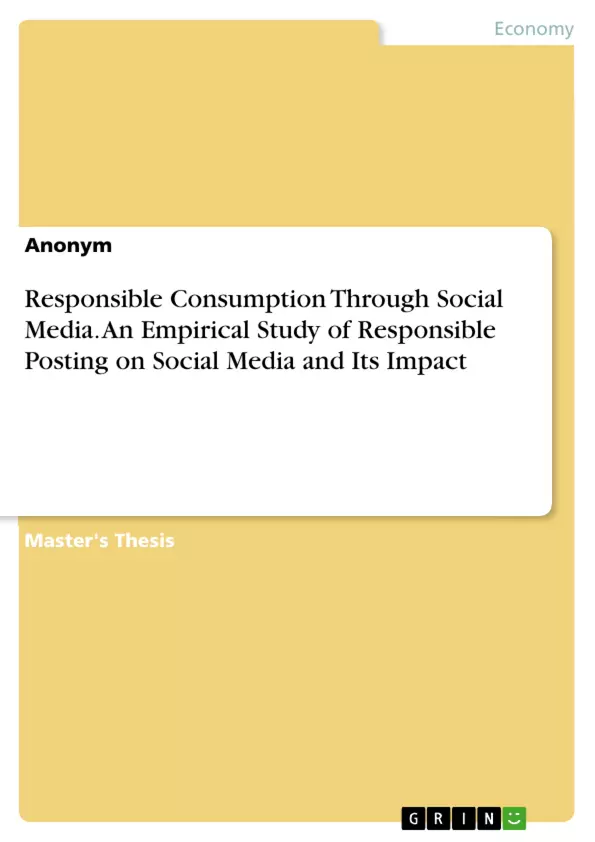Social food enterprises seek to positively impact global social and environmental grievances within the food industry. In their marketing, they rely on cost-effective channels such as social media, which is equally popular with consumers as a source of information about sustainability and food. The thesis examines the share of social media posts addressing impact topics in social food enterprises’ total posts and which key characteristics these possess. Impact-posts' effect on concern for the environment/society and environmentally/socially responsible consumer intentions is tested.
Both qualitative and quantitative content analysis were used to empirically identify the content characteristics of social media impact-posts from social food enterprises and their share in total posts. For this, a purpose-built category system was developed based on existing content analyses. Subsequently, a randomized between-subjects online experiment was used to assess the influence of impact-posts on the dependent variables. Results were analyzed using multivariate analysis of covariance.
Base for the content analysis was a sample of 454 Instagram posts of real-life social food enterprises including 121 impact-posts. The experimental study data were collected via an online survey with German-speaking participants (N = 234).
Findings: The content analysis revealed that impact topics are addressed slightly less frequently than product topics by social food enterprises on Instagram. Within impact-posts, social and environmental topics are generally focused on separately and with similar frequency. Enablement, support, and philanthropy just as environmental concerns represent the most common themes. Moreover, photos depicting people and supplemented with text are primarily used with both text and imagery being kept neutral to positive. Only one third of the impact-posts simultaneously address a product of the brand. The experimental study revealed no statistically significant influence of the impact-post opposed to its non-impact counterpart on concern for the environment/society and environmentally/socially responsible consumer intentions.
Inhaltsverzeichnis (Table of Contents)
- Introduction
- Background and Relevance
- Research Problem and Objectives
- Research Method
- Structure
- Literature Review and Research Problem
- Responsible Consumer Behavior
- Definition of Responsible Consumer Behavior
- Drivers and Antecedents of Responsible Consumer Behavior
- Marketing in Social Enterprises
- Definition of Social Enterprises
- Marketing Challenges for Social Enterprises
- Marketing Practices of Social Enterprises
- Priming Effect
- Objectives and Research Questions
- Responsible Consumer Behavior
- Study 1: Content Analysis
- Research Method
- Research Design
- Sampling Decisions
- Coding Procedure
- Intercoder Reliability
- Analysis and Results
- Category System
- Quantitative Analysis of Categories
- Discussion of Findings
- Research Method
- Study 2: Online Experiment
- Research Method
- Research Design
- Experimental Stimuli
- Questionnaire Design and Measures
- Procedure and Data Collection
- Analysis and Results
- Descriptive Statistics
- Reliability and Validity Check of Measures
- Verification of Premises
- Test for Effects
- Discussion of Findings
- Research Method
- Conclusion
- Summary and General Discussion of Findings
- Theoretical Implications
- Managerial Implications
- Limitations and Future Research Avenues
Zielsetzung und Themenschwerpunkte (Objectives and Key Themes)
This thesis aims to investigate the role of social media in promoting responsible consumption by social food enterprises. It examines the content of social media posts addressing impact topics and investigates the influence of these posts on consumer attitudes and behaviors.
- The role of social media in promoting responsible consumption by social food enterprises.
- The characteristics of social media posts addressing impact topics.
- The influence of impact-posts on consumer concern for the environment and society.
- The impact of impact-posts on environmentally and socially responsible consumer intentions.
- The potential for using social media to promote responsible consumer behavior.
Zusammenfassung der Kapitel (Chapter Summaries)
The introduction provides background information on the topic and outlines the research problem and objectives. Chapter 2 reviews relevant literature on responsible consumer behavior, social enterprise marketing, and the priming effect, establishing a theoretical foundation for the study. Chapter 3 presents a content analysis of social media posts from social food enterprises, exploring the characteristics of impact-posts and their prevalence. Chapter 4 describes an online experiment designed to assess the influence of impact-posts on consumer attitudes and behaviors. The conclusion summarizes the findings and discusses their theoretical and managerial implications, outlining limitations and future research avenues.
Schlüsselwörter (Keywords)
This study focuses on responsible consumption, social food enterprises, social media, impact-posts, content analysis, online experiment, consumer attitudes, and responsible consumer intentions.
Frequently Asked Questions
What are "impact-posts" in the context of social food enterprises?
Impact-posts are social media posts that address social or environmental grievances and the enterprise's efforts to solve them, rather than just promoting products.
How often do social food enterprises post about their impact on Instagram?
The content analysis revealed that impact topics are addressed slightly less frequently than product-related topics.
What are the most common themes found in impact-posts?
The most common themes include enablement, support, philanthropy, and general environmental concerns.
Do impact-posts significantly change consumer intentions?
The experimental study found no statistically significant influence of impact-posts on concern for the environment or responsible consumer intentions compared to non-impact posts.
How are these impact-posts usually designed visually?
They primarily use photos depicting people, often supplemented with text, and maintain a neutral to positive tone in both imagery and messaging.
- Citar trabajo
- Anonym (Autor), 2022, Responsible Consumption Through Social Media. An Empirical Study of Responsible Posting on Social Media and Its Impact, Múnich, GRIN Verlag, https://www.grin.com/document/1379489



